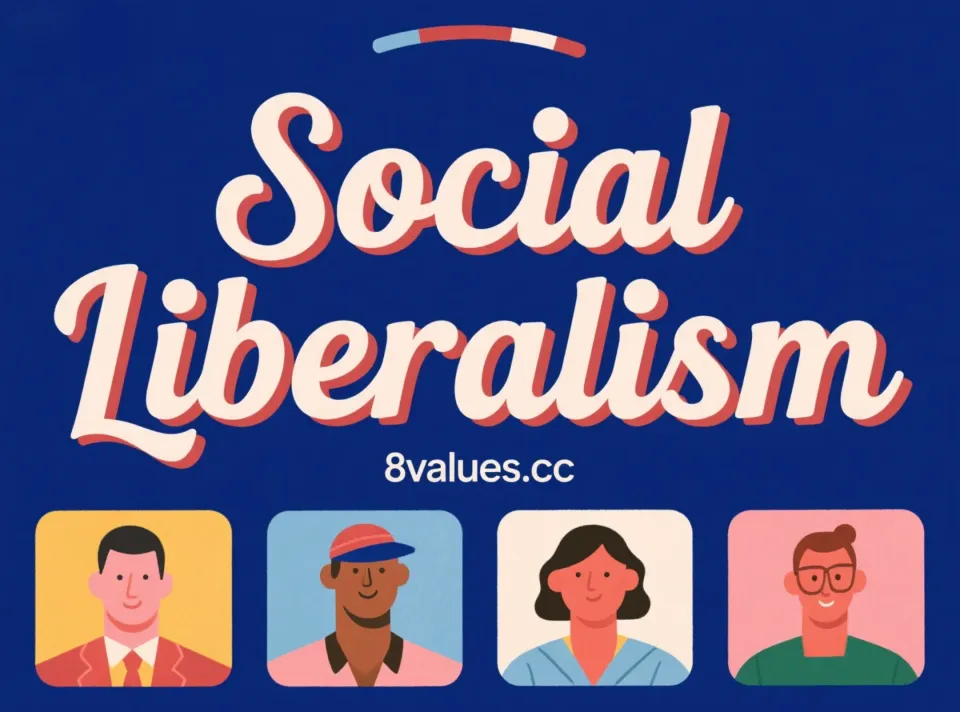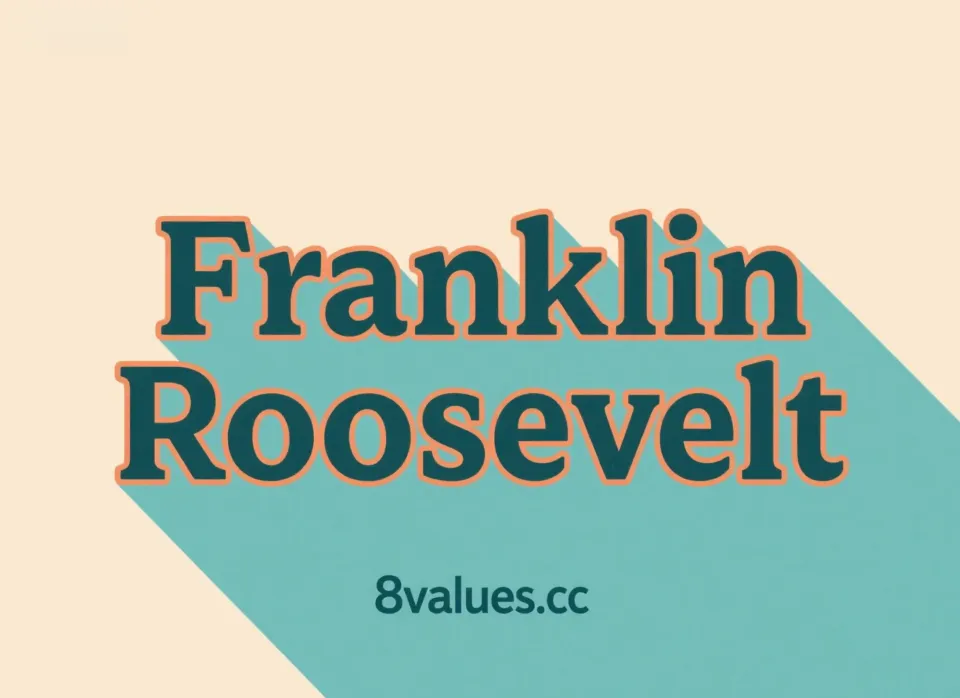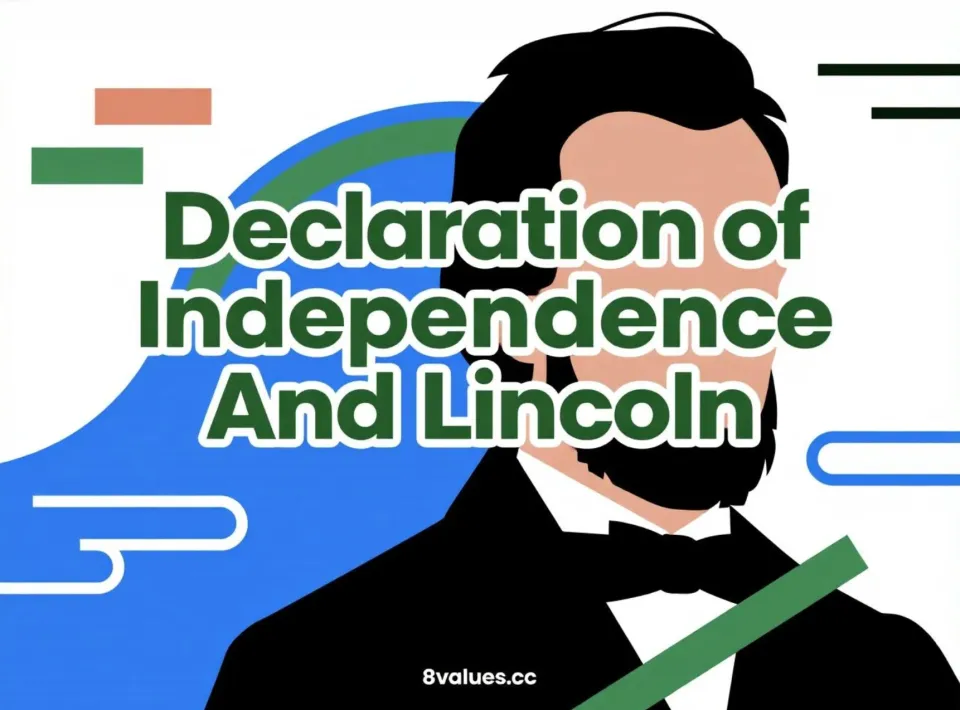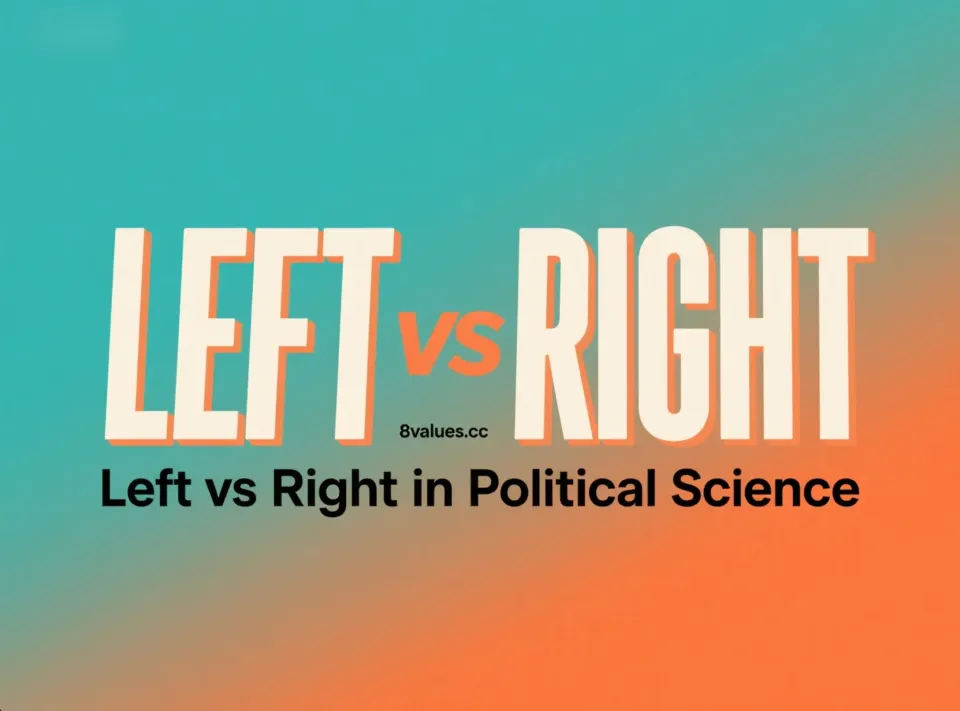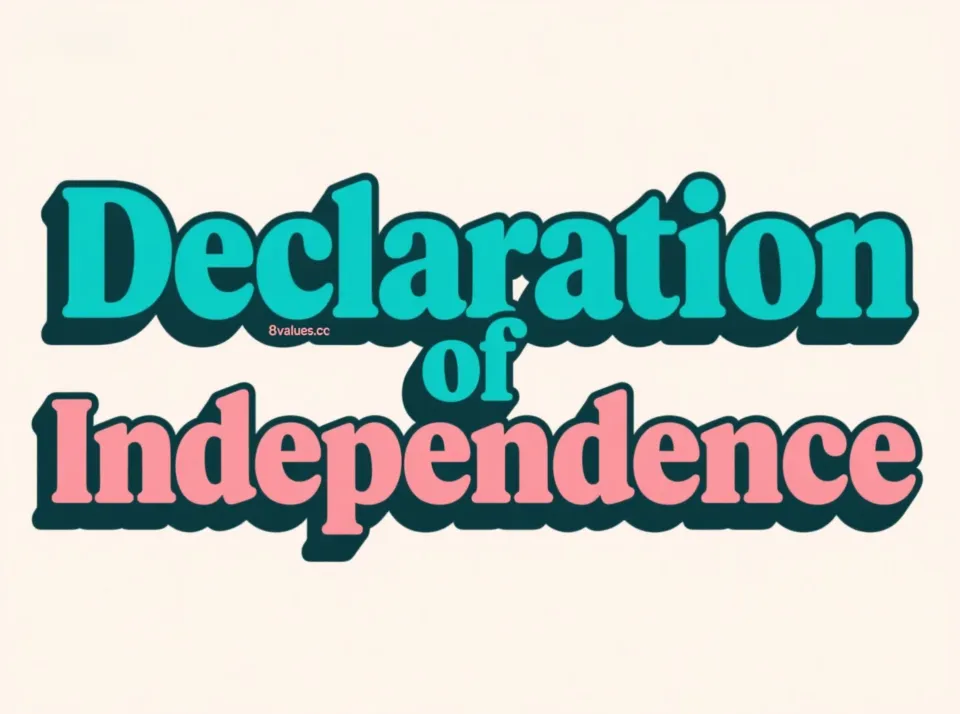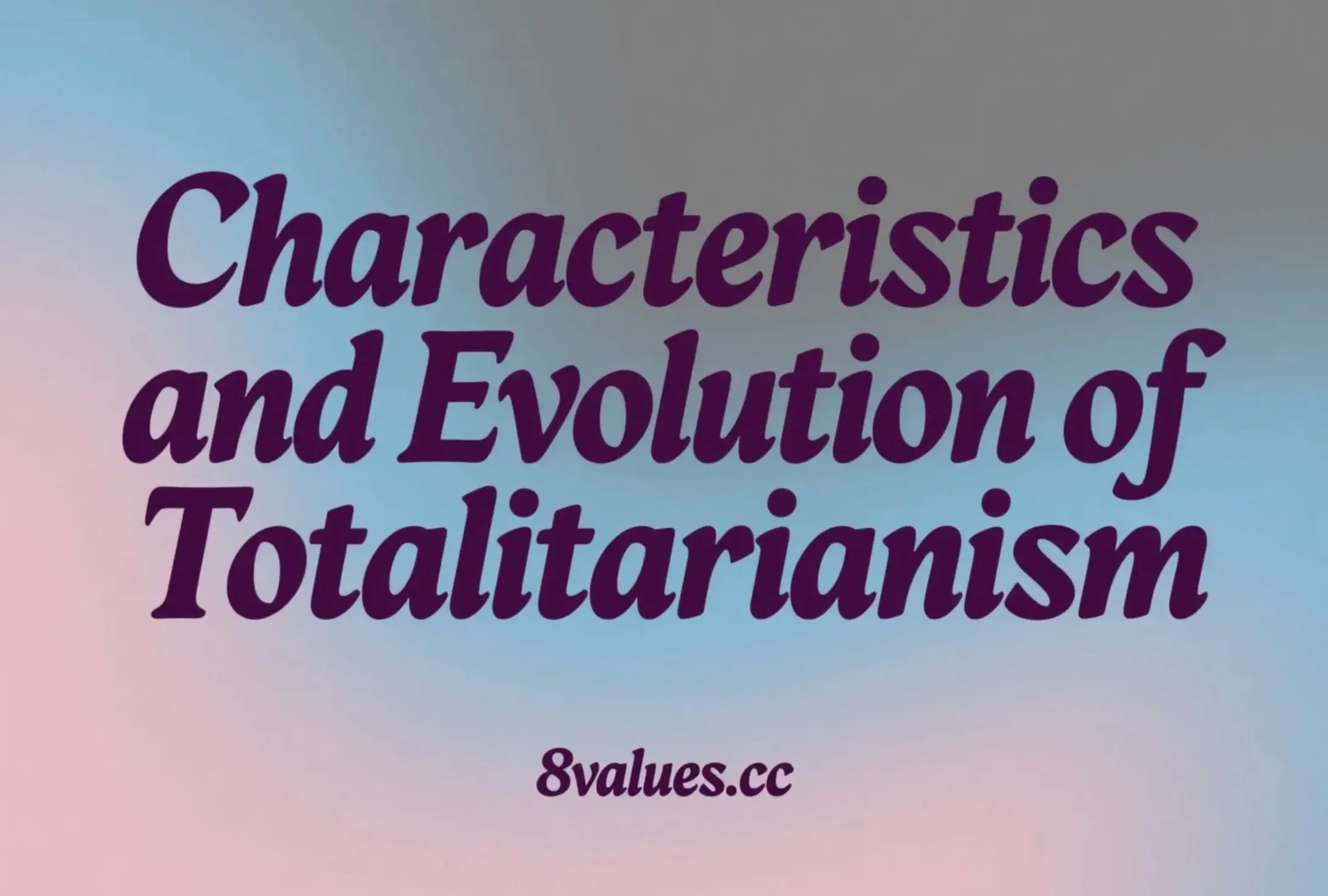Social Liberalism | 8values Interpretation of ideological ideology of political tests
What is social liberalism? Social Liberalism is a political philosophy that combines personal freedom and social justice. It goes beyond the framework of classical liberalism and emphasizes the positive role of government in ensuring equal opportunities, promoting social well-being and regulating market economy. This article will explore in detail the origins of social liberalism, its core principles, its differences from related ideologies and its practice and impact on a global scale, helping you fully understand this important political idea.
Social Liberalism is an important school of political thought that combines the core principles of liberalism—that is, the emphasis on individual rights, freedom and autonomy—with a deep concern for social justice, collective well-being, and the role that government plays in these aspects. Unlike classical liberalism that emphasizes limited government and a “lazy” economy, social liberals believe that true personal freedom can only be achieved under favorable social and economic conditions that require active government intervention to create and maintain.
If you want to further explore your own political inclinations, welcome to experience our 8values Political inclination test for more ideological results related to social liberalism.
The historical origins and ideological evolution of social liberalism
Social liberalism does not appear out of thin air, it is a response and development to Classical Liberalism in the face of challenges of industrialization and modernization.
The cornerstone of classical liberalism
Classical liberalism emerged in the 17th century, and its core idea revolved around Negative Liberty , which emphasizes the freedom of individuals to be free from external intervention (especially state intervention). Thinkers such as John Locke proposed "limited government" and "social contract theory", believing that the state should serve the people like a machine, rather than control the people. Its main responsibility is to maintain law and order and protect private property rights. Economically, classical liberalism advocates Laissez-faire capitalism , believing that the government should not interfere in the economy, and that the market should operate naturally under the guidance of the "invisible hand" to achieve efficiency and prosperity.
The impact of the wave of industrialization
However, with the deepening of the industrial revolution in the 19th century, the drawbacks of laissez-faire capitalism are increasingly emerging. Economic growth is accompanied by widening gaps between the rich and the poor, urban poverty, unemployment problems, and the rise of organized labor movements. The "elite management society" and "trickle-drop effect" envisioned by classical liberalism have not benefited everyone. Many people cannot realize their potential due to socio-economic factors, and formal freedom has become empty in reality. Faced with these challenges, some thinkers began to reflect on the limitations of classical liberalism.
The budding of "neoliberalism"
In the late 19th and early 20th centuries, a group of thinkers called " New Liberals " appeared in Britain, who were pioneers of social liberalism. They include John Stuart Mill, TH Green, LT Hobhouse and JA Hobson. Mill is seen as a transitional figure connecting classical liberalism with modern liberalism. He proposed "Developmental Individualism" and "Harm Principle", believing that if an individual wants to be truly free, he needs not only to be unrestricted, but also to have the ability to realize his potential. Education is crucial in this process.
TH Green further developed the concept of Positive Liberty . He believes that true freedom is not only "free from limitations", but also a "ability to do something", that is, the condition that an individual can realize his potential and realize himself. Therefore, the state has a moral obligation to create favorable conditions, such as providing education, medical care and social security, to empower individuals to achieve true freedom.
Keynesianism and the rise of welfare state
The economic crisis in the first half of the 20th century, especially the Great Depression of 1929, further exposed the vulnerability of the laissez-faire economy. John Maynard Keynes' economic theory came into being. He advocated that the government should actively interfere in the market economy, stabilize the economy, stimulate demand, and achieve full employment through fiscal expenditure, adjustment of interest rates and taxes , and respond to economic recession and prosperity cycles.
Keynesianism's economic thought coincides with the social liberal concepts, providing the government with a theoretical basis and practical path to establishing a Welfare State. After World War II, many Western countries generally adopted social liberal policies and established a comprehensive social security system covering areas such as pensions, unemployment insurance, health care and public education to ensure citizens' basic living standards and equal opportunities. For example, the United States' "New Deal" and the United Kingdom's "Beverridge Report" and the subsequent National Health Service System (NHS) are typical representatives of social liberal practice.
The core principles and concepts of social liberalism
Social liberalism redefines the traditional position of liberalism in several key areas:
1. Active freedom and comprehensive development
The core of social liberalism is to advocate positive freedom , which is in sharp contrast to the negative freedom of classical liberalism. It believes that it is not enough to just escape from external constraints; individuals also need to gain the ability to realize their potential and the conditions for self-development . This means the government has the responsibility to ensure that everyone has the ability to choose and pursue their goals rather than just enjoy formal rights by providing services such as public education, health care and social security. John Stuart Mill's "developmental individualism" emphasizes that education is crucial to individuals realizing their potential and the good functioning of democratic societies.
2. Social justice and equality of opportunity
Social liberalism firmly believes that all individuals have equal value and that regardless of their background, they should receive fair treatment and equal opportunity . It goes beyond the classical liberal concept of "Formal Equality before the law" and believes that structural inequality in society (such as poverty, discrimination) will hinder some groups' chances of success. Therefore, governments need to take positive measures to “level the playing field”, such as through anti-discrimination laws, Affirmative Action, and social welfare programs for vulnerable groups to ensure that everyone has real opportunities to realize their potential. John Rawls' "A Theory of Justice" is a milestone in this idea, proposing the "Difference Principle" that argues that social and economic inequality is acceptable only if it is favorable to the most disadvantaged society.
3. "Empowering State" and Government Intervention
Social liberalism advocates the establishment of an " Enabling State " rather than the "Night-Watchman State" emphasized by classical liberalism. This means that the government should not only protect individuals from infringement, but also actively create conditions so that individuals can fully exercise their freedom. Government intervention is seen as a tool to coordinate public interests, resolve market failures, prevent economic monopoly, and provide citizens with basic public services such as medical care, education, and infrastructure. Progressive Taxation and wealth redistribution policies are important means to achieve these goals.
4. Hybrid economic model
Economically, social liberalism supports the Mixed Economy model, which advocates appropriate government intervention and supervision while affirming the efficiency of the market economy. It does not seek to abolish capitalism, but hopes to better serve the overall well-being of society through management and regulation. Keynesianism provides a theoretical basis for this " managed capitalism ". Social liberals believe that economic stability and broader social progress can be achieved through government management of economic cycles and correction of market failures.
5. Inclusive socio-cultural policy
Social liberalism attaches great importance to civil liberties and human rights and is committed to promoting an inclusive, non-discriminatory open society. This includes supporting minority rights, LGBTQ+ rights, gender equality, women’s right to self-reproduction, immigration and multicultural policies, and strict environmental protection regulations. They believe that social discrimination and prejudice hinder the free development of individuals, and therefore the state has the responsibility to eliminate these barriers through legislation and policies.
Comparison between social liberalism and related political thoughts
To understand social liberalism more clearly, it is necessary to compare it with other political ideologies.
The difference between social liberalism and classical liberalism
As mentioned earlier, the core difference between social liberalism and Classical liberalism lies in the positioning of the role of government and the definition of freedom . Classical liberalism emphasizes negative freedom and minimal government , believing that government intervention is an infringement of individual freedom. Social liberalism advocates active freedom and empowering states , believing that moderate government intervention is to protect individuals’ conditions for achieving their freedom and thus promote broader social well-being. Economically, classical liberalism advocates laissez-faire capitalism , while social liberalism supports mixed economic and Keynesian government intervention .
The difference between social liberalism and social democracy
Social liberalism and Social Democracy have many policy similarities, such as supporting broad social welfare and the regulatory role of government in the economy. However, there are fundamental differences in the philosophical roots and attitudes toward capitalism . Social liberalism originates from the classical liberal tradition and firmly believes that the capitalist market economy is the foundation for realizing individual freedom . The purpose of its government intervention is to correct market defects, ensure equal opportunities, and make capitalism operate more fairly and more sustainable, rather than replace capitalism. Social democracy is rooted in socialist ideas and is more skeptical about capitalism. Although modern social democracy accepts mixed economy, its goals are more inclined to achieve more thorough wealth redistribution through state intervention, and may even advocate the nationalization of some industries to empower the working class and pursue deeper equality .
The difference between social liberalism and neoliberalism
Neoliberalism is often misunderstood as a nickname for social liberalism, but in political thought it actually represents a completely different direction, and can even be said to be an opponent of social liberalism. Neoliberalism is often seen as a newer version of classical liberalism , which criticizes modern liberalism for causing the state to be too large and intervene too much, and advocates the return to the principles of minimal government, laissez-faire economy and negative freedom . In many countries, neoliberalism is closely related to the new right movement in Conservatism , such as Thatcherism in the late 20th century and Reagan economics in the United States. Therefore, neoliberalism explicitly rejects welfare state and government intervention advocated by social liberalism .
The difference between social liberalism and social liberalism
Both social libertarianism and social libertarianism emphasize "freedom", but there are core differences in the definition of "freedom", government role, and balance logic between "individual rights" and "social fairness".
- Definition of "freedom" : Social liberalism advocates "substantive freedom", which is a combination of positive freedom and negative freedom, and believes that individuals need governments to guarantee the conditions for achieving freedom (such as freedom from lack). Social liberalism adheres to "pure negative freedom", that is, freedom from all involuntary coercion (especially government coercion), and believes that the harm of government intervention is far greater than that of social problems themselves.
- Government role : Social liberalism regards the government as the "empowerer" and the "balancer" and ensures social fairness and universal freedom through intervention. Social liberalism advocates " night watch state ", and the government is only responsible for protecting individual life, property and contract freedoms, and opposes the provision of public services.
- Economic Policy : Social liberalism supports progressive taxes , extensive public services and market regulation (such as minimum wage, antitrust). Social liberalism opposes progressive taxation and government provision of public services, advocates market-oriented solutions to problems , and opposes almost all market controls.
- Core logic : The former is to " promote freedom with fairness ", while the latter is to " abandon fairness with freedom "
Contemporary Practice and Prospect of Social Liberalism
The idea of social liberalism has had a profound impact on a global scale and its policy practices have been reflected in many developed countries.
Social liberalism in practice
In Europe, many socially liberal parties or parties with socially liberal tendencies play a role in government alliances, which are often seen as centrists or centre-left political forces. For example, the Liberal Democrats in the UK, the Democrats in the Netherlands, and the Liberal Party in the Danish Socialist Party are all representatives. The term "Liberalism" in the United States also almost specifically refers to social liberalism in the modern context, and there are important social liberal forces within the Democratic Party. The Liberal Party of Canada also strongly identifies social liberalism and regards social liberalism in its charter as a unique symbol of partisan identity.
On socio-cultural issues, social liberals advocate inclusive social policies and oppose discrimination based on race, gender, sexual orientation or religion. This includes supporting LGBTQ+ rights, women’s right to self-reproduction, immigration and multicultural policies, and aims to build an open, non-discriminatory society.
Challenge and Criticism
Although social liberalism has achieved remarkable achievements on a global scale, it also faces many challenges and criticisms. Economic criticism includes problems such as excessive government spending, excessive tax burden and inefficiency of the bureaucratic system . Conservatives are concerned that welfare programs may lead to citizens’ dependence on government and weaken individual motivation for efforts and self-reliance .
In some countries, such as the United States, there has also been a trend of " socially Liberal and Fiscally Conservative ". This position supports social equality and civil rights, but advocates restricting government spending, cutting welfare programs, and advocating the privatization of public services in fiscal policy. This reflects the ongoing debate on how to balance government intervention with economic efficiency while pursuing social justice.
Conclusion: The Future of Social Liberalism
Social Liberalism, as a political philosophy that adapts to the changes of the times, successfully combines the value of personal freedom with the pursuit of social welfare. On the basis of inheriting the importance of classical liberalism on individual dignity and rights, it expands its understanding of "freedom" and emphasizes the indispensable role of society and government in creating fair opportunities and promoting all-round development. In today’s world, the idea of social liberalism continues to evolve to address new global challenges such as environmental crises, technological changes and changing social structures. Understanding social liberalism will help us better grasp the context of global political thought and think about how to build a more fair, inclusive and sustainable society while protecting individual freedom.
If you are interested in other political ideologies in the 8 Values results or want to gain a deeper understanding of your political tendencies, you can visit our 8values All Results Ideology page and perform the 8values political tendency test . In addition, you can find more articles on political theory and its real-life applications in our blog .
